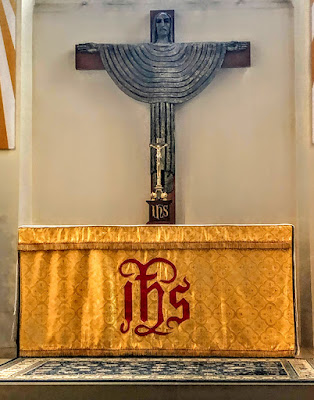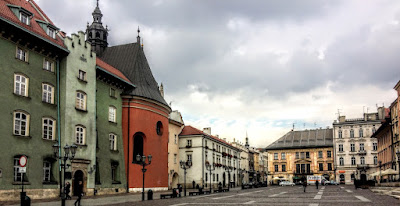‘I sometimes think about the cross,/ and shut my eyes, and try to see’ … the Stony Stratford Cross in Saint Mary and Saint Giles Church, sculpted by Antony Weller (Photograph: Patrick Comerford, 2022)
Patrick Comerford
This year marks the 150th anniversary of the composer Ralph Vaughan Williams, whose music is celebrated throughout this year’s Proms season.
In my prayer diary for these weeks I am reflecting in these ways:
1, One of the readings for the morning;
2, Reflecting on a hymn or another piece of music by Vaughan Williams, often drawing, admittedly, on previous postings on the composer;
3, a prayer from the USPG prayer diary, ‘Pray with the World Church.’
The readings for Morning Prayer in Common Worship this morning include:
II Corinthians 11: 16-33 (NRSVA):
16 I repeat, let no one think that I am a fool; but if you do, then accept me as a fool, so that I too may boast a little. 17 What I am saying in regard to this boastful confidence, I am saying not with the Lord’s authority, but as a fool; 18 since many boast according to human standards, I will also boast. 19 For you gladly put up with fools, being wise yourselves! 20 For you put up with it when someone makes slaves of you, or preys upon you, or takes advantage of you, or puts on airs, or gives you a slap in the face. 21 To my shame, I must say, we were too weak for that!
But whatever anyone dares to boast of—I am speaking as a fool—I also dare to boast of that. 22 Are they Hebrews? So am I. Are they Israelites? So am I. Are they descendants of Abraham? So am I. 23 Are they ministers of Christ? I am talking like a madman—I am a better one: with far greater labours, far more imprisonments, with countless floggings, and often near death. 24 Five times I have received from the Jews the forty lashes minus one. 25 Three times I was beaten with rods. Once I received a stoning. Three times I was shipwrecked; for a night and a day I was adrift at sea; 26 on frequent journeys, in danger from rivers, danger from bandits, danger from my own people, danger from Gentiles, danger in the city, danger in the wilderness, danger at sea, danger from false brothers and sisters; 27 in toil and hardship, through many a sleepless night, hungry and thirsty, often without food, cold and naked. 28 And, besides other things, I am under daily pressure because of my anxiety for all the churches. 29 Who is weak, and I am not weak? Who is made to stumble, and I am not indignant?
30 If I must boast, I will boast of the things that show my weakness. 31 The God and Father of the Lord Jesus (blessed be he for ever!) knows that I do not lie. 32 In Damascus, the governor under King Aretas set a guard on the city of Damascus in order to seize me, 33 but I was let down in a basket through a window in the wall, and escaped from his hands.
‘Three times I was shipwrecked’ (II Corinthians 11: 25) … Saint Paul’s Church above the Menqa or boat shelter at the harbour in Saint Paul’s Bay, the site of Saint Paul’s shipwreck (Photograph: Patrick Comerford, 2022)
Today’s reflection: ‘It is a thing most wonderful’
Ralph Vaughan Williams was the composer of symphonies, chamber music, opera, choral music, and film scores, a collector of English folk music and song. With Percy Dearmer, he co-edited the English Hymnal, in which he included many folk song arrangements as hymn tunes, and several of his own original compositions.
This morning I have chosen the hymn, ‘It is a thing most wonderful’ (Irish Church Hymnal, 226; New English Hymnal, 84), written as a poem in 1872 by Bishop William Walsham How (1823-1897).
The tune normally used for this hymn is Herongate, an Essex folk song arranged by Ralph Vaughan Williams.
William Walsham How, a solicitor’s son, was born in Shrewsbury in 1823 and educated at Shrewsbury School and Wadham College, Oxford (BA 1845). He was ordained in 1846, and was curate of Saint George’s, Kidderminster (1846), Holy Cross, Shrewsbury (1848), before becoming the Rector of Whittington in the Diocese of St Asaph in 1851. He was later a Rural Dean (1853), a canon of Saint Asaph Cathedral (1860), chaplain of the English church in Rome (1865) and Rector of Saint Andrew’s Undershaft, London, (1879).
He became a Suffragan Bishop for East London as Bishop of Bedford, and in 1888 he became the first Bishop of Wakefield, a new diocese in the industrial heartlands. His untiring work among the people of the docks and the slums earned him the title of ‘the poor man’s bishop,’ and because he insisted on using public transport he was also known as the ‘omnibus bishop.’ But he liked best his description as ‘the children’s bishop.’ He died in Leenane, Co Mayo, in 1897, while on a fishing holiday in Dulough.
Bishop How, who was strongly influenced by the Tractarian Movement, was the author and editor of several collections of hymns, sermons and children’s stories, many of them published by the Society for Promoting Christian Knowledge (SPCK), and he wrote at least sixty hymns.
His hymns are marked by pure rhythm as well as directness and simplicity, showing a comprehensive grasp of the subject and throwing unexpected light on their themes, with images interwoven with tender thoughts. Although he is seldom thought of as a poet, his hymns have outlived his other literary works and he is one of the most effective Victorian hymn writers.
Seven of his hymns are included in the Irish Church Hymnal. His most popular hymns include ‘For all the Saints who from their labours rest,’ (Irish Church Hymnal, 459; New English Hymnal, 197), ‘It is a thing most wonderful’ (Irish Church Hymnal, 226, New English Hymnal, 84), ‘To thee our God we fly’ (Irish Church Hymnal, 540, New English Hymnal, 127), and ‘Who is this so weak and helpless’ (New English Hymnal, 474).
‘It is a thing most wonderful’ was written by How, while he was Rector of Whittington in Shropshire – then in the Diocese of St Asaph but now in the Diocese of Lichfield – but it was not published until 1872.
The first version was five verses in length, but within 15 years he had added two more verses to the original. Through this hymn, How is trying to reveal the love of God by looking at the Cross through the eyes of a child. In the 1872 draft, he placed the text I John 4: 10 above the hymn: ‘Herein is love, not that we loved God, but that he loved us, and sent his son to be the propitiation for our sins.’
The tune ‘Herongate’ is one of several folksong melodies collected by Vaughan Williams. He transcribed the tune of ‘In Jesse’s City’ in 1903 when he heard a maid singing that song in Ingrave Rectory near Brentwood, about three miles from Herongate in Essex. It was first used with this hymn in 1906 in the first edition of the English Hymnal, which Vaughan Wlliams edited with Percy Dearmer.
It is a thing most wonderful
It is a thing most wonderful
almost too wonderful to be
that God’s own Son should come from heaven
and die to save a child like me.
And yet I know that it is true:
he came to this poor world below,
and wept and toiled, and mourned and died,
only because he loved us so.
I cannot tell how he could love
a child so weak and full of sin;
his love must be most wonderful
if he could die my love to win.
I sometimes think about the cross,
and shut my eyes, and try to see
the cruel nails, and crown of thorns,
and Jesus crucified for me.
But, even could I see him die,
I could but see a little part
of that great love which, like a fire,
is always burning in his heart.
How wonderful it is to see
my love for him so faint and poor,
but yet more wonderful to know
his love for me so free and sure.
And yet I want to love you, Lord:
O teach me how to grow in grace,
that I may love you more and more
until I see you face to face.
‘We pray for the Anglican Church in Poland which serves communities in Warsaw, Krakow and Gdansk’ … the Mały Rynek or Small Square in Kraków (Photograph: Patrick Comerford)
Today’s Prayer:
At the annual conference of the USPG (United Society Partners in the Gospel) in High Leigh last week, we were updated on the work of USPG’s partners in Ukraine, Russia and with USPG’s partners with Ukrainian refugees. The theme in the USPG prayer diary this week is ‘Refugee Support in Poland,’ and was introduced by the Revd David Brown, Chaplain of the Anglican Church in Poland.
Tuesday 2 August 2022:
The USPG Prayer Diary invites us to pray today in these words:
We pray for the Anglican Church in Poland which serves communities in Warsaw, Krakow and Gdansk.
Yesterday’s reflection
Continued tomorrow
Scripture quotations are from the New Revised Standard Version Bible: Anglicised Edition copyright © 1989, 1995, National Council of the Churches of Christ in the United States of America. Used by permission. All rights reserved worldwide. http://nrsvbibles.org




No comments:
Post a Comment